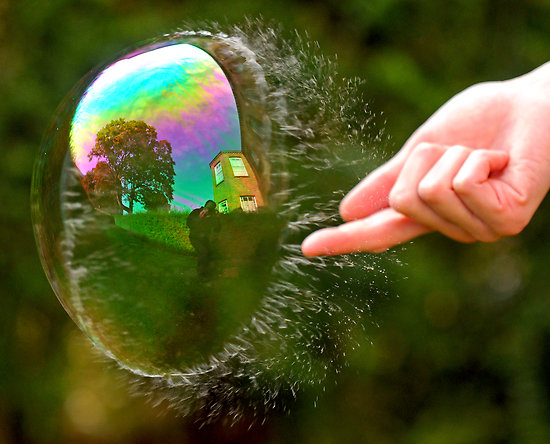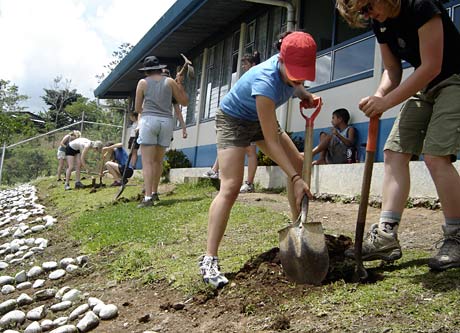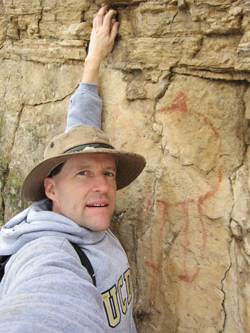 The Achievement Bubble, by Scott Herring, Posted October 1, 2012 Scott Herring is back with another observation of life at Cal State Davis and the "super-achievers."
The Achievement Bubble, by Scott Herring, Posted October 1, 2012 Scott Herring is back with another observation of life at Cal State Davis and the "super-achievers."
Ours is a bubbly economy, as that economy has reminded us over and over, without the lesson hitting home: credit bubble, housing bubble, dot-com bubble, and so on back through the centuries. We know, at least, what a bubble looks like on the inside, from the bubble victims themselves. From the inside, they will later say, the bubble did not seem irrational at all. The herd instinct prevailed.
Lately, we have been warned that higher education is another bubble. Because it is still on the rise, we cannot know how dangerous the bubble is. Calculating the nature of the thing is hard to do, as I can show by looking at another source of anxiety, closely related to the higher education bubble: the phenomenon of the overachieving student.
Here is the creature that David Brooks named the Organization Kid, the undergrad who cold-bloodedly aims for admission to medical school, and sets about assembling the requisite sixteen-ton résumé. Writing in The New York Times, publisher James Atlas terms them Super People, and gives a useful description: no such Super Person fails to have “mastered at least one musical instrument; helped build a school or hospital in some foreign land; excelled at a sport; attained fluency in two or more languages; had both a major and a minor, sometimes two, usually in unrelated fields (philosophy and molecular science, mathematics and medieval literature); and yet found time—how do they have any?—to enjoy such arduous hobbies as mountain biking and white-water kayaking.”
Remember, however, that the active participant, while inside a bubble, has no idea that the bubble exists, playing by its rules, responding not to logic, but to the code of the bubble. The hyper-achievement Atlas describes is yet another bubble. We do not see it as such because the thing being inflated is people, experience, human capital, and does not directly involve money. It otherwise acts like every bubble in history: it inflates value in a way that we would recognize as delusional if we were not trapped within the madness. We are caught in the grip of a résumé bubble.
At my University of California campus, I teach writing, and specialize in advanced classes for health science students. One of our assignments is a personal statement, that standard piece of the professional school application. The prompts are vague, asking, simply, who are you, why do you want to come to our school, and what have you done to prepare? The students’ first response is bafflement, enlivened by terror. I nurse them through the process, and every personal statement comes out essentially the same, for the simple reason that the students have all led highly similar lives. They have heard for years that they must pile up achievements and volunteer experience. They produce documents that impress nearly everyone. Except me. I have finally learned to ask the questions that we never ask, and so have discovered the résumé bubble. The gas that fills it comes from unquestioned assumptions.
 The average personal statement includes that paragraph about helping the homeless: “During my time at the Ho Chi Minh Memorial Center for the Homeless in San Francisco, I learned to care for those cast off by our society.” The unquestioned assumption: that a twenty-year-old has anything to offer a homeless man who has, let us say, been suffering untreated paranoid schizophrenia for decades. What the homeless need—intensive psychiatric care, usually—is not available from our students. At the homeless shelter, they do the laundry and take out the trash, and from the hushed conversations I overhear, they find the experience disgusting.
The average personal statement includes that paragraph about helping the homeless: “During my time at the Ho Chi Minh Memorial Center for the Homeless in San Francisco, I learned to care for those cast off by our society.” The unquestioned assumption: that a twenty-year-old has anything to offer a homeless man who has, let us say, been suffering untreated paranoid schizophrenia for decades. What the homeless need—intensive psychiatric care, usually—is not available from our students. At the homeless shelter, they do the laundry and take out the trash, and from the hushed conversations I overhear, they find the experience disgusting.
The students have shadowed practitioners of their chosen art. The pharmacy students all have internships at discount drug store chains, where they learn how to run the cash register, and little more. The unquestioned assumption: that the cash register has pharmacological knowledge in it. When I was a student, at least they paid us, but now students run the cash register for free.
Other shadowing experiences, especially in the ER, do at least function as tests: can they tolerate the blood, the shattered bones, the screaming? They are otherwise ignored, and end up doing the scutwork again. Only the most generous (or, with the young female students, lecherous) doctors do any teaching. Unquestioned assumption: that merely standing in the presence of highly technical medical procedures, years beyond their understanding, teaches students valuable knowledge about procedures they often cannot even name.
And so on. Rare is the student who has not studied violin or piano, but we forget that musical talent is distributed unevenly. The majority of our students have studied their instrument, yes, but cannot play it without making all the cats and dogs on the block start howling. A second language is a requirement, and every student has impressive “knowledge” of one, buttressed by a semester abroad. But we forget what we all know: that unless a second language is put to use every day, it atrophies with terrible speed. Again, the student is not lying; that semester in Barcelona did, in fact, result in “knowledge” of a thing resembling Spanish. Now let the student try to talk to someone from Mexico, and see what use it is to know how to order dinner, in Catalan.
The students take what they can from the “experiences” they pile up, which act primarily as a signaling device, proof that they can delay gratification, no small accomplishment in the boozy atmosphere of a college campus. But let us not be fooled. Look again at that list of accomplishments James Atlas sees in his Super People. Think about what people are actually like. Understand that 21-year-olds cannot rack up those accomplishments, if only because there are not enough hours in the day. What they have mastered is the skill of making themselves look better than they are, without having to lie.
Their behavior does have a cynical, manipulative side, but we have seen worse bubbles than this one. My students are, at least, better grounded in reality than the people who slapped together that prospectus for Pets.com, or took out a two-million-dollar mortgage on a one-bedroom fixer-upper next to the sewage plant in Oakland.
 Scott Herring teaches writing and literature at the University of California, Davis. Before he got his Ph.D., he worked for years in Yellowstone National Park, and still carries on a hopeless love affair with the place. In the photograph, he’s hanging from a cliff therein.
Scott Herring teaches writing and literature at the University of California, Davis. Before he got his Ph.D., he worked for years in Yellowstone National Park, and still carries on a hopeless love affair with the place. In the photograph, he’s hanging from a cliff therein.